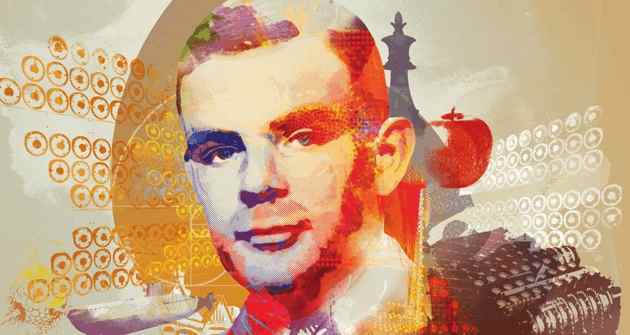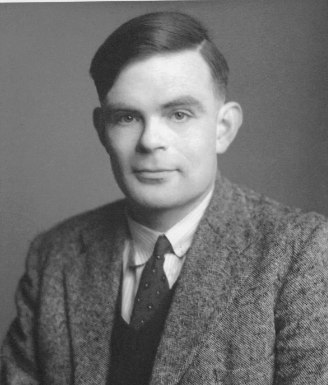| Celebrating Alan Turing |
| Written by Sue Gee |
| Friday, 07 June 2024 |
|
Today, June 7th 2024 is the 70th anniversary of the untimely death of Alan Turing. While we now commemorate him for his contributions to code-breaking computer science and artificial intelligence, seventy years ago his wartime contributions were still cloaked in secrecy and his homosexuality was considered, and treated as, a crime.
The centenary of Alan Turing's birth in 2012 brought worldwide recognition of his achievements both as a mathematician, logician and computer scientist and for his work as a codebreaker during World War II at Bletchley Park that is thought to have shortened the conflict saving thousands of lives. It also drew attention to the punishment meted out to him for being gay, both inside and outside the justice system. By today's standards - both legal and moral - nothing in Turing's behavior would have led to an arrest let alone a conviction. He wasn't accused of any violence or solicitation. Instead when police visited his home to investigate a burglary they discovered his relationship with 19-year-old Arnold Murray, and the charges faced by both men for "Gross Indecency" were for consensual sex that took place at Turing's home. Both men pleaded guilty. Despite having a further offence taken into consideration, Murray's sentence was to be bound over to keep the peace for 12 months. Turing, however, faced a more serious penalty. The court acknowledged him to be: "one of the most profound and original mathematical minds of his generation" so rather than prison he was put on probation for 12 months with the stipulation that he submit to chemical castration. The year-long course of injections rendered Turing impotent. In addition to this brutal treatment, and possibly even more unbearable, shortly after his conviction, his security clearance was revoked, denying him the ability to continue his cryptographic consultancy for GCHQ although he kept his academic position of deputy director of the Computing Machine Laboratory at the University of Manchester. Turing was also denied entry into the United States, limiting his ability to network with other computer scientists. In 2009 British Prime Minister Gordon Brown issued an apology for Turing's treatment but allowed his conviction to stand on the grounds that homosexuality had been a criminal offence at the time. However in 2013, after pressure that included an e-petition that gathered more than 23,000 signatures and a letter to the Telegraph newspaper by signed by a group of highly regarded UK scientists, including Professor Stephen Hawking, a full Pardon was issued, see Official Pardon For Turing. It was on June 8th, 1954, two weeks short of his 42nd birthday, that Turing housekeeper found him dead in his bed with a half-eaten apple on the bedside table. An postmorten determined that cyanide poisoning was the cause of death, even though the apple wasn't tested for cyanide and that Turing had committed suicide. An inquest, held on June 9th, confirmed this verdict and two days later his body was cremated. with his ashes scattered in the gardens of the crematorium. His mother never accepted this verdict and one of his biographers, Jack Copeland, questioned the verdict suggesting the alternative explanation of accidental inhalation of cyanide fumes from apparatus used to electroplate gold onto spoons that Turing had in his spare room. Alan Mathison Turing (June 23, 1912 - June 7,1954) Accident or suicide, Turing's death at age 41 was untimely, but 70 years on his legacy continues. In his life time he had, in 1946, been awarded an OBE (Order of the British Empire) for his contributions to the war effort and in 1951 had been made a Fellow of the Royal Society for a: "substantial contribution to the improvement of natural knowledge, including mathematics, engineering science, and medical science". Since his death there has been much more recognition of his achievements, in particular during 2012, dubbed Alan Turing Year, when the 100th Anniversary of his birth was celebrated. An extensive list of posthumous tributes is maintained on Wikipedia and we have details of many of them, most recently a statue, see Related Articles. More InformationThe Alan Turing Internet Scrapbook Legacy of Alan Turing (Wikipedia) Related ArticlesTuring Year: The Legacy Explored Alan Turing Commemorated In Steel Statutory Pardon For Alan Turing Widespread Celebrations But No Pardon For Turing Turing Exhibition and Facebook Timeline Commemorative Stamp for Alan Turing To be informed about new articles on I Programmer, sign up for our weekly newsletter, subscribe to the RSS feed and follow us on Twitter, Facebook or Linkedin.
Comments
or email your comment to: comments@i-programmer.info
|
| Last Updated ( Friday, 07 June 2024 ) |




